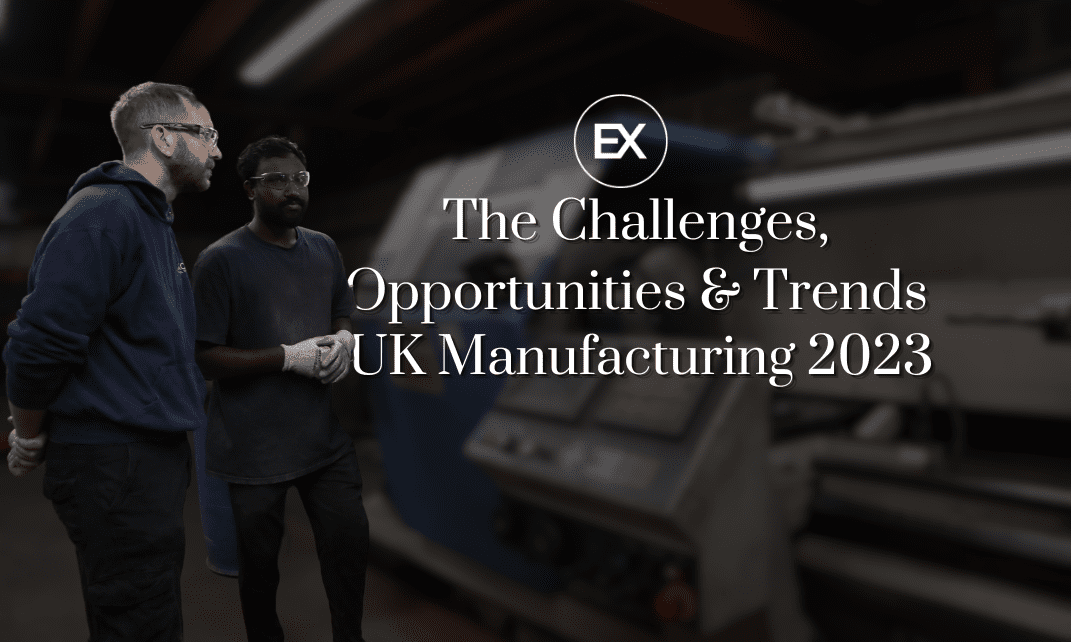UK Manufacturing 2023; The Challenges, Opportunities and Trends

Curtis Bligh
- 4 Min Read
The UK manufacturing sector continues to play an important role to the UK economy. 9.4% of total UK economic output and 51% of all UK exports is generated by the manufacturing industry. The sector is also a source of innovation, growth and employment, supporting 2.7 million jobs and contributing £192 billion to UK GDP.
However, the sector continues to face challenges old and new throughout 2023. Much of which comes from the aftermath of COVID-19 and the EU-UK Trade and Cooperation Agreement. Inflationary pressures and the rising energy costs have also posed significant challenges to UK manufacturing. What’s more, supply chain disruptions and a tight labour market continue to hound manufacturing businesses leading into Christmas.
In today’s blog post, we will take a closer look at the challenges and opportunities that have presented themselves this year. Let’s explore some of the external factors that are shaping our industry today.
The Challenges Faced by UK Manufacturing in 2023
Inflationary pressures have posed particularly problematic for many manufacturers reaching a 10 year high in September. Although very recently falling down to 4.6% in November from 5.1%, inflation had a profound effect on business. Several factors were behind these rises. They include a global surge in commodity prices, along with rising energy prices and continued labour shortages. As a result, input costs and operational costs for UK manufacturing saw a sharp rise. This made it difficult for manufacturers to remain competitive with eroding profit margins. Furthermore, consumer demand has plummeted as a result of inflation pressures affecting business confidence, sales and investment for manufacturers.
UK manufacturers are also still reeling from the effects of the pandemic which created uncertainty and volatility in the market conditions. Much of production was disrupted in addition to the distribution and consumption of goods and services. Ultimately, this has led to declining output and exports.
The EU-UK trade and Cooperation agreement that came into effect on January 1st 2021 has also created barriers and costs to UK manufacturing. Tariffs, quotas, regulatory standards and more are impacting access and competitiveness in the EU markets. 47% of UK exports is to the EU, and new measures are proving problematic for some businesses.
The Opportunities for UK Manufacturing 2023
However, it’s not been all doom and gloom this year. Despite the challenges, there have been some significant opportunities for the manufacturing sector. As market conditions and customer preferences continuously shift, UK manufacturing has proven itself to be resilient and adaptable.
In recent weeks, government announced a £4.5 billion funding boost for British manufacturing. It aims to increase investment in eight key sectors across the UK. These include Aerospace, Automotive, Chemicals, Construction, Food and Drink, Life Sciences, Metals and Rail. These sectors are understood to have the highest potential for growth, innovation and competitiveness in the global markets. The funding will also support the development of new technologies, products and processes in addition to new jobs and skills. Furthermore, it will help the UK achieve its industrial strategy and its net-zero emissions targets to support a greener more digital society.
Another major opportunity has also presented itself to UK Manufacturing this year. Technology investments within areas such as automation, robotics and Artificial intelligence are proving to be particularly useful for growth goals. These technologies are helping manufacturing improve productivity, efficiency and competitiveness in addition to reducing costs, waste and their environmental impact. Furthermore, these enhancements are improving innovation, quality and customer satisfaction.
According to MAKE UK, 71% of UK manufacturers have planned or currently are investing in technology this year. 59% of manufacturers expect technology to have a positive impact on their business performance!
Trends To Look Out For In UK Manufacturing
There are some trends worth keeping your eye out for within UK Manufacturing. Let’s take a look at some below;
Environmental Focus
UK manufacturers are adopting various measures and practices to improve their environmental sustainability. These include transferring to renewable energy sources, implementing circular economy principles and developing low-carbon products and processes. In addition, manufacturers are now becoming much more transparent when reporting their environmental performance.
“New Collar” Employees
Manufacturers in the UK are now beginning to look for employees who combine technical skills with creativity and problem solving. These skills are essential for the adoption of new technologies as well as innovation and competitiveness in the sector. These employees are often referred to as “new collar” as they fit beyond the traditional categories of blue/white collar workers. Investment in training and upskilling the existing workforce is fast becoming common practice.
Employer Brand
UK manufacturing organisations are fast recognising the importance of having a strong and positive employer brand. Especially when competing for talent in a tight labour market. It is also ideal for enhance their company reputation and customer loyalty. Manufacturers are building employer brand by highlighting work culture and conditions. This is in addition to showcasing their values and vision, CSR and career development opportunities.
Roundup of the Challenges, Opportunities and Trends in UK Manufacturing 2023
2023 has proven to be a year filled with uncertainties and challenges. Yet all the while, has showcased how dynamic and resilient UK manufacturing continues to be. There have been many opportunities ever present throughout the sector and manufacturing is undergoing important changes and developments.
From a government funding boost, to new technology investment and increased environmental focus. The changes and developments happening now will shape the future of UK manufacturing as well as the future of the UK economy and society as we know it.
Related Articles

Boosting British Manufacturing: A £360 Million Investment
Boosting British Manufacturing: A £360 Million Investment Facebook Twitter LinkedIn WhatsApp Email It’s been declared ahead of the Budget that Chancellor Jeremy Hunt will announce

Design Considerations for Metal Spinning Success: Part One
There are many design considerations businesses should considers to get the most out of their metal spinning supply. Read Part One here

The Importance of Innovation in UK Manufacturing
Manufacturing plays a pivotal role within the UK, shaping society and innovating like no other. It is the most productive sector in the UK

